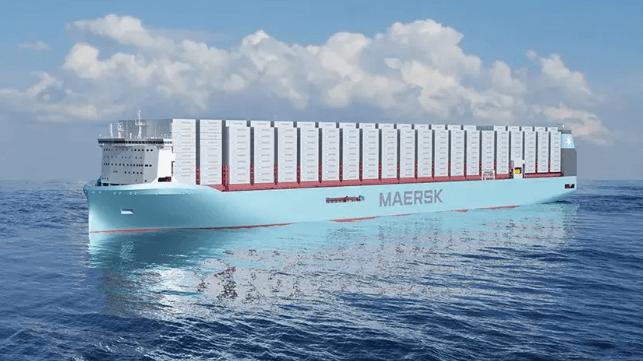Maersk Orders Another Six Methanol-Fueled ULCVs

Maersk has ordered six more methanol-fueled, 17,000 TEU container ships from Hyundai Heavy Industries (HHI) as part of its decarbonization strategy.
The number two ocean carrier is aiming to take the lead in low-carbon ocean freight, and it has placed more orders for methanol-fueled dry cargo vessels than any other operator. In addition to its previous 13 methanol-powered newbuild orders, it has ordered a further six ULCVs to replace older tonnage in its fleet.
Benchmarked against equivalent conventional fuel vessels, the company expects that the new ships will cost about eight to 12 percent more to build, which is an improvement compared to when it ordered eight vessels with the same technology last year.
The new order brings to 19 the number of newbuilds that the company has ordered with dual-fuel methanol engines since 2021. When all 19 vessels on order are deployed and have replaced older vessels, they will generate annual CO2 emissions savings of around 2.3 million tonnes.
The six 17,000 TEU vessels will be delivered in 2025 and will sail under the flag of Denmark.
“Our customers are looking to us to decarbonize their supply chains, and these six vessels able to operate on green methanol will further accelerate the efforts to offer our customers climate neutral transport. Global action is needed in this decade in order to meet the Paris Agreement’s goal of limiting global warming to a 1.5°C temperature rise,” said Henriette Hallberg Thygesen, Maersk Fleet & Strategic Brands CEO.

that matters most
Get the latest maritime news delivered to your inbox daily.
Maersk has set a net-zero emissions target for 2040 across its entire business, along with near-term targets for 2030. This includes a 50 percent reduction in emissions per transported container in the Maersk Ocean fleet compared to 2020 and a principle of only ordering newbuilt vessels that can be operated on green fuels. It believes that methanol is the best scalable green fuel solution for this decade, and several other shipowners are choosing the same path, h adds further momentum to the rapid scaling of availability needed to bring down the premium on green methanol and accelerate the evolution of climate neutral shipping.
Maersk's strategy calls for capping fleet capacity at its current size of 4.3 million TEU, leaving the number-one carrier slot to its 2M alliance partner MSC. Its discipline on ordering supports its exceptional financial performance: it expects to earn an underlying EBITDA of $37 billion for 2022.
